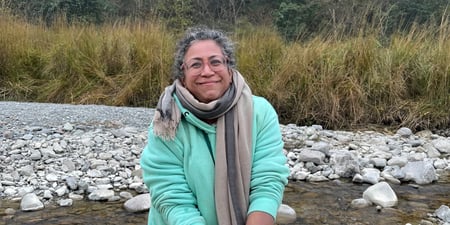
Being a parent is one of the most rewarding and challenging life experiences there is. At the age of 47, I gave birth to my daughter. My son was 18 at the time. I was a first-timer again.
I expected that all would go well, and yes, she was a healthy, beautiful baby. However, I wondered why I was so tired. My tiredness was increasing over those first few months. I was responding to her regular three-hour intervals and breastfeeding all through the night, and sleeping when I could, but fatigue was hitting me hard.
I relied on my meditation practices to get myself back to sleep anytime, day and night. I also discovered that I needed an outlet for my irritation. One of the unfortunate side effects of a lack of sleep can be frustration and feeling overwhelmed. I found myself super sensitive to noises like the loud clock tick tick TICKING away at my nerves. I found that I also needed a quick release of this pent-up emotion so that I could come back to providing a loving, safe space to be with my baby girl.
There were times when writing down my experiences and emotions in my journal helped, as I could close the book when I needed a break from all my worries or concerns. Did I have enough breast milk? Was I happy enough? Was I social enough, active enough? Was I providing enough stimulation and enrichment for my daughter?

When my daughter was around five months old, I was still feeling deep fatigue, and while visiting my doctor for routine blood tests, the results revealed that I had Hashimoto's - an autoimmune disease specific to the thyroid gland. It is a condition sometimes related to pregnancy and birth. When the thyroid gland is not producing enough thyroxine, your whole metabolism slows down. Every cell in your body has a “metabolism switch”, and mine had switched off. It was functioning dangerously low, as after all, I was an older mother and had laboured for 13 hours.
The doctor prescribed a thyroxine replacement, and soon, my energy levels started to improve, my optimism and sense of humour returned. I was glad to have some energy back and to keep up with my daughter's growing needs and curiosity about everything.
However, she still did not sleep through the night, even though she wasn’t hungry and could go back to sleep herself. I, on the other hand, was alert and awake and couldn’t get back to sleep. I was hyper-vigilant to her slightest sound, and so even though I wasn’t needed, I would wake to the slightest stirring or sound. For the next four years, I averaged two to four hour blocks of sleep. I guess you could call it insomnia.
It dawned on me in the wee hours before sunrise one day that I needed to forget about trying to get eight hours of sleep and instead meditate – this became my mindful practice time. Sometimes I would fall asleep, and other times I would be meditating until morning. The difference being instead of lying awake, irritated, or bogged down by negative thoughts or unhelpful ruminations, I did my one-pointed focus, which meant that my body-mind-spirit was calm.

Reframing the meaning of lack of sleep to being a spiritual practice of surrendering to what is...
During that time of insomnia, I wrestled with my own lack of patience, and I worked hard to let expectations and attachments go. I became more resilient, and today I feel I am a much better person for this experience of sleep deprivation. I meditate often now and always enjoy teaching my clients to meditate. I love recording my guided meditations with the intention of supporting other mothers and fathers who may be feeling the effects of sleep deprivation. I created a set of guided meditations called Mother Nurture Her[1], which are a beautiful gift to give yourself or your loved ones.
Essential sleep practice provides you with a quick and easy method for getting back to sleep whenever you need to, day or night. When you listen to these meditations, you will be guided to relax deeply, to let go of any frustrations, and to connect with your loving heart and return energised and attentive to the needs of your baby.
Being a parent and choosing to follow a spiritual path that grows from a deep commitment to family life is one of the best self-development courses you can ever attend. It is a lived experience.
A spiritual practice can be one which focuses on building relationships where difference is embraced and understanding thrives: where trust, love, integrity and honesty are encouraged. I have found that life gives you all that you need, and loving life strategies are practices for many of those important transition times in your life.
References
1. Mother Nurture Her (Meditations for Busy Parents). Apple Music; 2011.
Disclaimer: This Content has been developed from our generous global community and is intended for informational purposes only. This Content is not, nor is it intended to be, a substitute for professional medical advice, diagnosis, or treatment and should never be relied upon. Further, the personal views and experiences published are expressly those of the author, and do not represent the views or endorsement of SoulAdvisor through the act of publication on our site.































